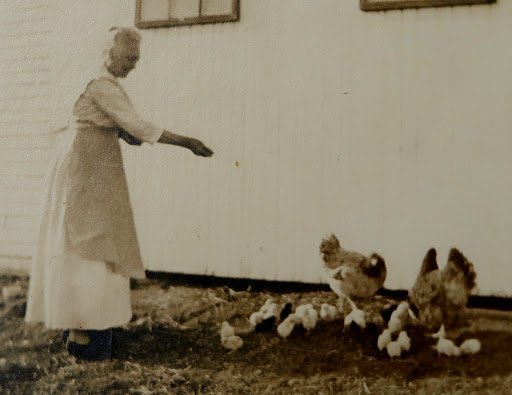An Antique Loveseat and Its Pioneer Limestone Owner
“Your grandfather’s going to take that loveseat to the dump if you don’t take it first,” Gram told me, over the phone. “Do you want it?”
Gramp never did appreciate anything that was an antique. And now that his youngest son’s furniture was being moved into his house, he had no interest in keeping a Victorian loveseat.
Gram had kept it all those years because it had once belonged to her grandmother, Mary Grant (Ward) Spear, a Limestone, Maine, resident who was related at one time to half the town.
The seat had sat for years in the corner of my grandparents’ dining room. I had played by that seat, sat on it, slept on it.
“I’ll take it,” I told Gram.
Afterward, it stayed in my parents' house for years, enjoyed by pet cats, visitors, family. Eventually, my parents had the seat reupholstered, and when I later moved, I took the seat with me.
After that, more cats slept on the seat, snuggling against the cushioned back. The wood shone, despite its age, and the curved carvings continued to amaze visitors. “Surely this is hand-carved,” one person said. “Possibly a local wood…butternut?”
Children again played and sat on the seat, giggled with friends, whispered secrets, cuddled cats, or fallen asleep when not feeling well. The chair has been loved by them all.
Mary Ward was 12 years old when she moved to northern Maine in 1859. Her pioneering family cleared some of the virgin forest and started a farm, but that didn’t stop Mary from appreciating and enjoying fine things and family.
Her clothes, in the images that remain of her, were “just so.” Sometimes she would smile at the camera, when that was not common. She collected bone china dishes so thin that you could see the shadow of your hand when holding a plate up to the light. She sent lovely cards to friends and family for Valentine’s Day, Christmas, birthdays.
Mary married Joseph Spear, another homesteader, when she was about 18 and probably acquired the little loveseat at that time. Like her husband, she attended church and the local farmers’ grange. She participated in civic groups such as the Women’s Christian Temperance Union and the Ladies Aid Society, and staged family photographs on her lawn outside with a larger loveseat from her house.
Joseph and Mary eventually had several children, 10 or more grandkids, and several great-grandkids. Joseph died in 1912, and Mary continued living on their farm for another year or so before moving to her daughter’s residence. She died in 1927 at the age of 79.
“Mrs. Spear was never an old lady,” a local newspaper explained, “for she fully enjoyed youth and its interests.”
From chickens to children, fine clothes to bone china, gardens to well-made furniture, Mary Spear lived. And a bit of her zest for life lives on in the old loveseat which never really seems to grow old to those, who like Mary, know how to take the time to enjoy.






